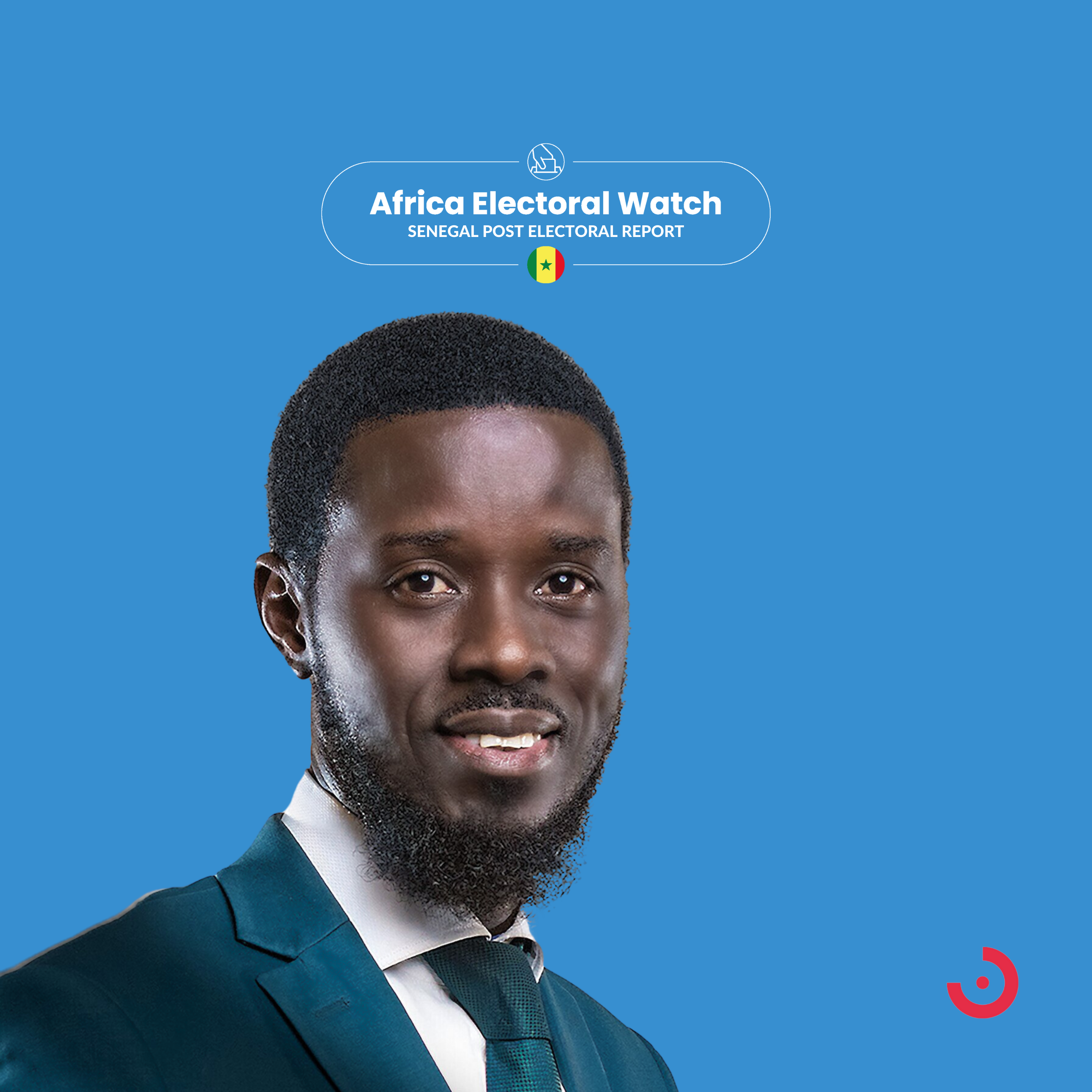Back
Africa Electoral Watch | Senegal 2024 - Presidential election post-electoral analysis
22 April 2024

Analysis
On 29 March 2024, Senegal’s Constitutional Council announced the first-round victory of political opponent Bassirou Diomaye Faye, with 54.28% of the vote, against 35.79% for the ruling party’s candidate, Amadou Bâ.
On 29 March 2024, Senegal’s Constitutional Council announced the first-round victory of political opponent Bassirou Diomaye Faye, with 54.28% of the vote, against 35.79% for the ruling party’s candidate, Amadou Bâ. Diomaye Faye established himself as the anti-system and anti-imperialist candidate championing a break with the past, as well as coming to the aid of young people affected by rising unemployment and immigration. Against a backdrop of general mistrust of institutions and uncertainty following a turbulent election period, Diomaye Faye’s term of office began with two top priorities: promoting national reconciliation and reassuring international investors. Combating corruption, fighting inflation, reducing poverty, creating jobs and implementing tax reforms are some of the major challenges. Unsurprisingly, the president appointed Ousmane Sonko as Prime minister. On 5 April, he unveiled a streamlined cabinet of 25 ministers, drawn largely from the ranks of Pastef.

KEY TAKEAWAYS
- Pastef candidate Diomaye Faye won the presidential election in the first round, with 54.28% of the vote, becoming Senegal’s youngest president - World leaders hailed the smooth running of the elections, which strengthened the image of Senegalese democracy, despite an uncertain pre-electoral period - National sovereignty, local content, youth employment, the fight against inflation and the responsible management of natural resources are at the core of the new executive’s priorities - Investors remain wary of the new government,whose announced policy measures and lack of transparency about the government’s real ambitions to implement them are giving cause for concern - In the short term, the new government’s ability to implement these reforms will be limited by political and economic realitiesA political wind of change
With a turnout of 61.30%, slightly lower than the previous poll in 2019, this presidential election nevertheless mobilised the masses. This was an important challenge in this election, which took place in a very special context, marked in particular by a shortened electoral campaign: two weeks instead of the 21 days stipulated by the electoral code, and the celebration of Ramadan. Released from prison ten days before the election, after eleven months in pre-trial detention, Pastef candidate Bassirou Diomaye Faye won the presidential election with a score of 54.28%, comfortably beating the establishment candidate, former Prime minister Amadou Bâ, chosen by outgoing President Macky Sall (35.79% of the vote). The other candidates obtained very low scores. Mamadou Dia, who came third, received just 2.8% of the vote. The former mayor of Dakar, Khalifa Sall, obtained a meagre 1.56%. He was the last candidate to cross the 1% threshold. Faye’s victory also reflects the break-up of the Benno Bokk Yakaar coalition, which failed to rally around its candidate Amadou Bâ. Already penalised by the presidential vote, the legacy of Macky Sall’s governance could take another blow at the next legislative elections, with persistent tensions within BBY. However, the bipolarisation of Senegal’s political landscape is likely to persist. Finally, the rejuvenation of Senegal’s political class and administration should be one of the main consequences of Bassirou Diomaye Faye’s victory.A non-conformist government dominated by Pastef figures
Sonko’s government is made up of a majority of technocrats, most of whom have never held ministerial office. Ousmane Sonko and Diomaye Faye have chosen to entrust the implementation of their project to Pastef executives. They account for almost half of the new appointees. Birame Souleye Diop, the new minister of Energy, Petroleum and Mines, is one of the heavyweights of the patriot movement. Vice-president of Pastef and president of the parliamentary group of the Yewwi Askan Wi coalition, this ally of Sonko is considered to be one of the most moderate members of the party. His appointment to this position, at a time when Senegal is preparing to become an oil and gas producer, marks the executive’s intent to retain direct oversight over issues relating to natural resources. Another iconic figure from the movement, Malick Ndiaye, Pastef’s Communications Secretary, becomes minister for Infrastructure and Land and Air Transport. At the head of Senegalese diplomacy is Yassine Fall, a former international civil servant and Pastef vice-president in charge of international relations. She is one of four women appointed to the government. Amadou Moustapha Ndieck Sarre, appointed minister for Vocational Training and Government Spokesperson, is another Pastef figurehead. To balance this government, the Faye-Sonko duo has also surrounded itself with individuals from aligned parties, such as the new minister of National Education, Moustapha Mamba Guirassy, a former minister under the Wade regime. His party «Sénégal en Tête» (SET) had backed the candidacies of Sonko and Faye. He was campaign director for the Diomaye Président coalition. Former supporters of the outgoing president have also joined this maverick government, including Serigne Guèye Diop, minister of Industry and Trade, who was Macky Sall’s adviser in charge of agriculture and industry. Sonko’s government team is also notable for its major absentees. Former prime minister Aminata Touré, former minister Habib Sy and MP and former minister Aïda Mbodj, fervent supporters of Diomaye Faye, were expected to be featured in the list of appointees. Wade’s Parti démocratique sénégalais (PDS), for its part, did not inherit any posts, despite its last-minute support for Pastef.PRIORITIES
